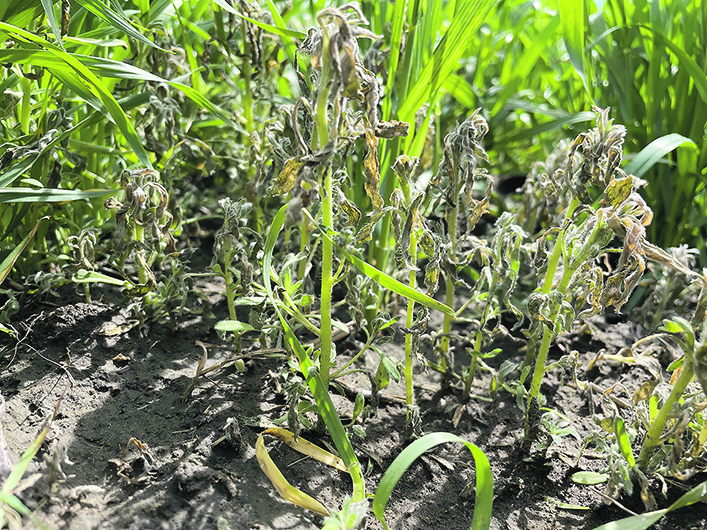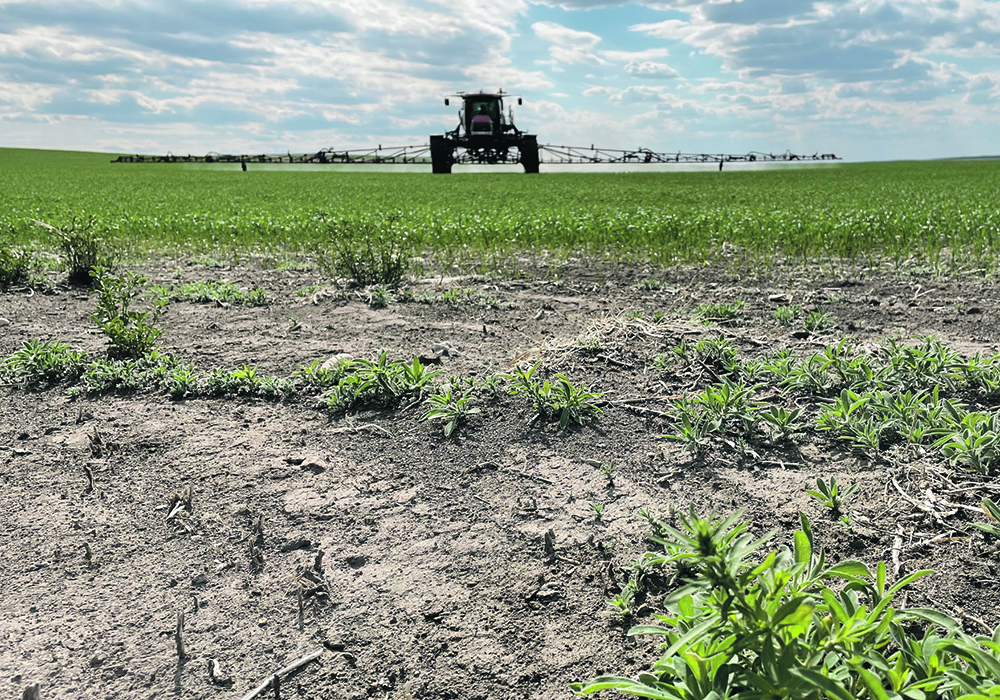Dual-modal herbicide for wheat and barley allows for planting of peas or lentils in the following year
Growers in the dark brown and brown soil zone have a new herbicide option designed to control kochia in cereals.
Corteva Agriscience’s OnDeck has a Group 6 (bromoxynil) and a Group 27 (tolpyralate), an active ingredient that is new to the western Canadian cereal market.
Jason Smith, Corteva’s western portfolio marketing manager for cereal herbicides, said OnDeck will be a valuable tool to help fight herbicide resistant kochia.
Essentially, all kochia on the Prairies is considered resistant to acetolactate synthase inhibitor and there are populations resistant to glyphosate, dicamba, and fluroxypyr.
Last summer, kochia resistant to PPO inhibitors may also have surfaced in Saskatchewan.
OnDeck provides access to modes of action previously difficult to use in brown soil zones because of rotational restrictions.
“OnDeck is a Group 27 and 6 herbicide, and unlike some other Group 27 and 6 herbicides that are on the market, we don’t have those rotational restrictions into lentils and peas, and to a lesser extent into canola in the year following application,” Smith said.
He said OnDeck will help reduce the reliance on fluroxypyr, which has been doing much of the heavy lifting in areas with high kochia pressure.
OnDeck offers control over key broadleaf weeds like kochia, wild mustard, wild buckwheat, and volunteer canola, as well as control of green and yellow foxtail in wheat and barley crops.
Recent dry years on the Prairies have prolonged the activity of some herbicides and caused crop damage the year after application.
Smith said Corteva has done extensive rotational studies to make sure that isn’t a problem with OnDeck.
“We’ve seen great rotational flexibility. Lentils tend to get used as the canary in the coal mine just because they are so sensitive rotationally. So that would be the crop that we would use but we would also have peas in there as well, and we’ve demonstrated excellent crop safety up to three times our high rate of OnDeck.”
Most growers in Western Canada are likely not familiar with tolpyralate, and Smith said it’s important to remember it’s a contact herbicide.
“A lot of guys would have experience with systemics, but with the contact actives one of the things that we know that’s critical for performance is water volume. Our recommendation is that customers that are using OnDeck should be applying at a water volume rate of 10 U.S. gallons per acre,” Smith said.

In areas with environmental stressors including hot, dry, or cooler application temperatures, Smith recommends an oil-based adjuvant at half-percent volume concentration solution.
“Where we have poor crop competition because of dry conditions and the cop doesn’t come up as quickly or maybe have some variable stage crop. In that kind of situation, we recommend using something like the oil-based adjuvants as well. So, when we talk about oil-based adjuvants, we’re specifically talking in MSO (methylated seed oil), HSOC (high surfactant oil concentrate) or COC (crop oil concentrate),” Smith said.
When it comes to recommended crop stage for application, he said OnDeck broadened Corteva’s portfolio.
“A lot of our products are applications from three leaf to flag leaf. This one is really a fit for that customer that’s looking at doing early applications. We can go in as early as one leaf, and then our upper window is going to be jointing, but really our recommendation with this is going to be going in early when the crop is small. When the weeds are small, that’s going to give us the best level of control,” Smith said.


















